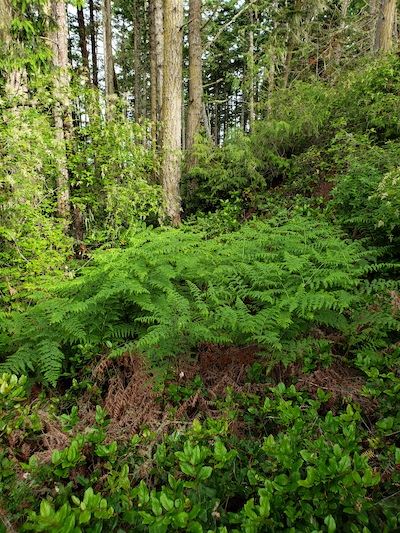Disorder

I’m in British Columbia right now, in a pine forest on the Pacific Coast of Vancouver Island. And it’s a total mess.
There are broken branches and tangled weeds all over the ground. Dead trees lying right next to live ones. Stuff just grows any which way. In any give space you might step on a bunch of animal waste. The birds, rabbits, deer, and bears don’t give it a second thought, they just ramble around as if all this disorder is normal.
Disgusting.
I’m kidding, of course. This is a lovely, peaceful, soul-healing place. The disorder is part of it . . . it does what it wants, and you just immerse yourself in it.
But why is disorder wonderful here and awful in other places?
If you had this level of crap lying around in the floor in your house or office, you’d be stressed. You’d put effort into cleaning it up, and then you’d feel like you’d done a great service to yourself and anyone else visiting.
If your hard drive or cloud storage had this level of disorder, you’d be unable to work effectively. If your code had this level randomness, it would be unusable and impossible to maintain.
But disorder is the natural state of things. It’s an actual freakin’ law of the universe: the second law of thermodynamics, which states that entropy always increases.
Our work days are chaotic — you never know when a crisis will hit, or a client will demand help, or an opportunity will arise that you really must jump on right now.
And our lives our chaotic. A child falls down the stairs. A parent gets diagnosed with cancer. A house burns down. A lover breaks faith. A friend needs help. These are things you can prepare for, but you cannot plan for them.
And yet, we constantly strive to restore order. We cannot tolerate the chaos; the urge to restore order and balance is as human as love or speech.
So why does the chaos of nature restore us?
I cannot cease my own desire to create order, any more than anyone else can. I have an engineer’s instinct to solve problems, a mathematician’s tendency to find patterns, a writer’s desire to make sense of things.
What I may do differently from now on is to appreciate the majesty of chaos for a moment before I go back to fighting it.
Check out A Perfect Mess: The Hidden Benefits of Disorder by David H. Freedman. Great read.
I love the perspective of this article. I am personally pretty comfortable with a little chaos. I think it is one of the gifts I bring to helping people with their own books. However, I never put it in the perspective of the natural world and like the fact you explain chaos as inevitable. When we can embrace the reality of disorder being necessary before order can be obtained, it makes it highly valuable to us and our clients.
Great observation Josh. Like you, my instinct is to solve problems, find patterns, make sense out of things or find connections when there seemingly are none. But I tire of constantly doing that. Going “off the grid” and just being in nature is very relaxing, almost meditative to me. This is why I enjoy hunting, offroading, or simply listening to the waves and birds on the beach. I call all of it “my zen”. Enjoy the rest of your vacation.
Two other amazing celebrations of natural disorder: “The Overstory” – Pulitzer Prize-winning novel celebrating trees by Richard Powers, and a documentary movie called “The Biggest Little Farm” that’ offers a firsthand account of how a Los Angeles couple quit the big city to start a biodiverse agricultural operation on land which had long since been stripped of nutrients.’ Both are restorative and compelling.
It may seem like chaos up above, but a fascinating episode of RadioLab explains the organized network of roots and fungi below the surface: https://www.wnycstudios.org/story/from-tree-to-shining-tree
😱RAKE IT!😱🔥🔥🔥
Man versus nature is pretty much the defining aspect of the post-war, post-modern era. Look a little behind wherever you might be there in my beautiful home province and you could find rampant clearcut logging, silted up salmon streams from torrential rains and “tree farms” that plant monoculture species in order to maximize profit. But yeah, the remaining ten percent of the province that does receive environmental protection is pretty damned great. And nature is hardly benign; leave a garden or a backyard untended for a winter or two here in the temperate rainforest and you’ll be encroached by invasive species (and native ones) within a year.